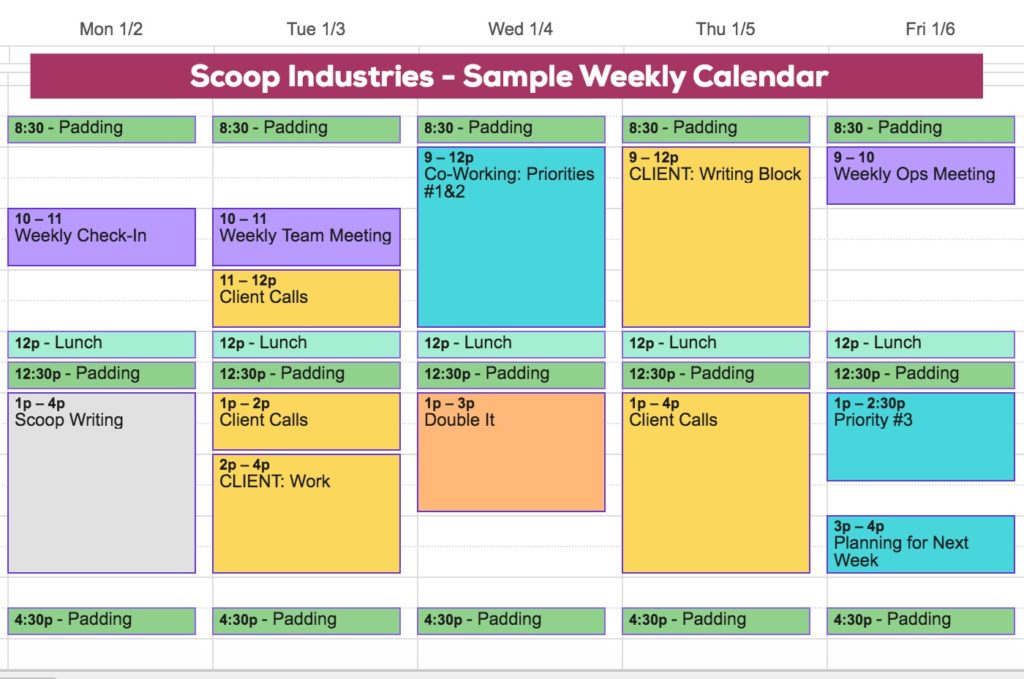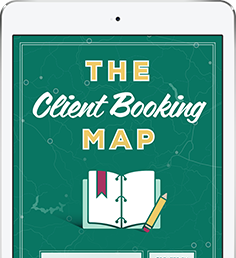
As we start a new year, it’s pretty normal to want to start new habits, including being able to better manage our time and planning our days so we’re able to get things done.
Productivity and time management are always a hot topic, but what happens when your day is fragmented because you’ve got a million and one things going on? Welcome to the life of a small business owner, as you wear all the hats and are in charge of, well, everything.
This is especially true when you run a services business, as there are simply more details, more demands on your time and more things taking up space in your head.
That’s why you need to realize that your business is different when you work with clients. Your time needs to be managed in a way that lets you plan and prioritize your time so it works for you. That ensures you’re not running around doing a bunch of things that are going to drive you into the ground over time.
I know I didn’t start a business to be a stressed-out hot mess, and I’m sure you didn’t either. Learning how to better manage my days has been an evolution, but I wanted to share with you some specific strategies that have worked for me in the past two years:
Focus, Focus, Focus
Confession time. I’m a high achiever (I’m sure you feel me on that one!) which means I think I’m Superwoman and that I simply must do everything.
By learning how to stop doing everything, I’ve been able to create focus in a way that I never imagined possible. For me, this has been an exercise in identifying my priorities.
I’ve moved from big hairy goals that span a full year to short, focused periods where I work on a set of three goals for 12 weeks. Working in this way gives me the freedom to say no to things that aren’t in alignment with these goals and avoid being sucked into the next shiny object.
When you think about the next 12 weeks, you need to set goals for you and your business that are based on what will have the most impact. This may require some soul searching as you realize that things you “want” to do aren’t serving you.
As a services business owner, I like to lay out three goals every 12 weeks as follows:
- Client Focused Goal: What do I need to do to book more clients, bring in more revenue, serve clients better? By picking one area, I’m able to make an impact much faster and make the goal a reality.
- Business-Centric Goal: This is typically an internally focused goal that’s centred on marketing or systems that supports your bigger vision. This could be something like launching a podcast, doing Facebook Live or another high impact activity.
- Personal Development: What do I need to focus on personally to move the business ahead? Do I need to develop a skill? Get more sleep? Take more time to be creative? Setting a goal here helps to ensure that I’m taking care of my needs because if I’m struggling, that’s not good for business.
Block Your Weeks
Have you ever had that moment around 1:00 p.m. where you feel like you’ve saved the world and you’re shattered? That’s what happens when you’re constantly switching back and forth all day long between tasks.
This is called context switching, and it means your brain is working way too hard. Each time you stop and start a task you’re losing valuable time and your productivity is impacted by up to 30%. Your brain needs to recalibrate and get back up to speed every time you re-start.
This is why blocking out chunks of time each week has literally saved my brain. Instead of multitasking all day, every day, I work in a way that lets me focus on a single task in a time block.
Using this approach means no more switching back and forth, and it lets me carve out time to ensure I’m working on all of my priorities for that 12 week period.
There are a number of ways to do this, but I love creating theme days where I have dedicated blocks of time in the week for specific tasks. For example, Fridays I focus on operations. I know that each week, I have that time set aside to work on financials, team, systems and other items that need attention.
I also do this with phone calls. Each week, I block Tuesdays and Thursdays to be available for client, team and new business calls. That way I don’t have the expectation that I’m going to work on a technical project and get frustrated.

Ideally, look to set up an “ideal” calendar for your weeks so you’ve got a plan week in, week out. Also, once you’ve set your 12 week priorities, you can carve out time in your week to focus on them as well.
Padding Everyday
Before you decide this is all good in theory, but not realistic, I’m going to be honest with you. Managing your days, and ensuring you don’t get derailed, is going to take some work.
For you to really manage your time, you need to create space for the day-to-day routine tasks you need to handle (like your email inbox) as well as for client communications.
This “padding” is key to you being the boss of your day and not letting something little throw you off track. Adding padding into your calendar every single day to check email, social media and handle routine day-to-day things will give you the peace of mind to know you’ve got time to handle it.
Both Maggie and I have three padding blocks during the day of about 30 minutes each that we use for email, checking in with each other and our team, getting up to date on client projects and more. This time is a lifesaver as I don’t feel the need to “jump to” the second something happens, as I know that at Noon I’ve got time to deal with it.
Speaking of padding, don’t pack your calendar so tight every single day and week that one small client request is going to be a major drama. Plan for client priorities to come up and have a little extra padding so you can handle them with ease and grace.
Peek Ahead
You know why people hate Mondays? It’s because they show up Monday morning unprepared and let the day happen to them.
Before you start your Monday, you need to have a plan for what’s going to happen for the week. This “peek” ahead helps you keep your eye on your priorities and go into the week feeling calm and in control.
How you do this will depend on your own approach to things. I aim to take some time on Fridays, before I wrap up, to review calls, deadlines and priorities for the week and get them into my planner. On the other hand, Maggie likes to do this on Sunday evenings so it’s fresh for her on Monday morning.
It doesn’t matter how you do this, it’s that you do it BEFORE you roll into your office on Monday morning, open your inbox and chaos reigns.
Kind But Firm Boundaries
Most people who run services businesses tend to be people pleasers, which can be amazing as it means you actually care about your clients and those around you.
But it’s a fine line between providing great service to your clients and being a total doormat. Enter boundaries, which are a must if you’re ever going to be more productive and be the master of your time.
Boundaries are the only way you’re going to stay sane if you work with clients. If you’re at your client’s beck and call, 24/7, you’re going to become resentful and burnt out over time. Setting boundaries starts with clearly establishing expectations.
Think about things like your response times. How fast can you turn things around? What types of deadlines are realistic? Communicating these basics with your clients will go a long way towards ensuring that you’re on the same page.
For example, for most clients we have a 24 hour response time during the week and then 72 hours on the weekend. That means they can expect a timely response and don’t need to worry about it.
Figure out what your boundaries are and work towards setting these out in a way that’s firm, but kind, with your clients. If you’ve been working with certain clients for a while, it may take some time to reset, but it will be worth the work.
Also, remember you’re the boss, so if you block Mondays as a day for no calls, simply book your client calls the following day. You don’t need to explain or ask for permission. You get to decide and manage your time accordingly!
If there’s one lesson I’ve learned from running my business (and there have been oh so many!) it’s that time management and productivity are ALWAYS going to be a work in progress. No matter where you are today with your time management, there’s room for small, incremental improvements that can make a big impact over the course of a month or year.
[embed_popupally_pro popup_id=”9″]

